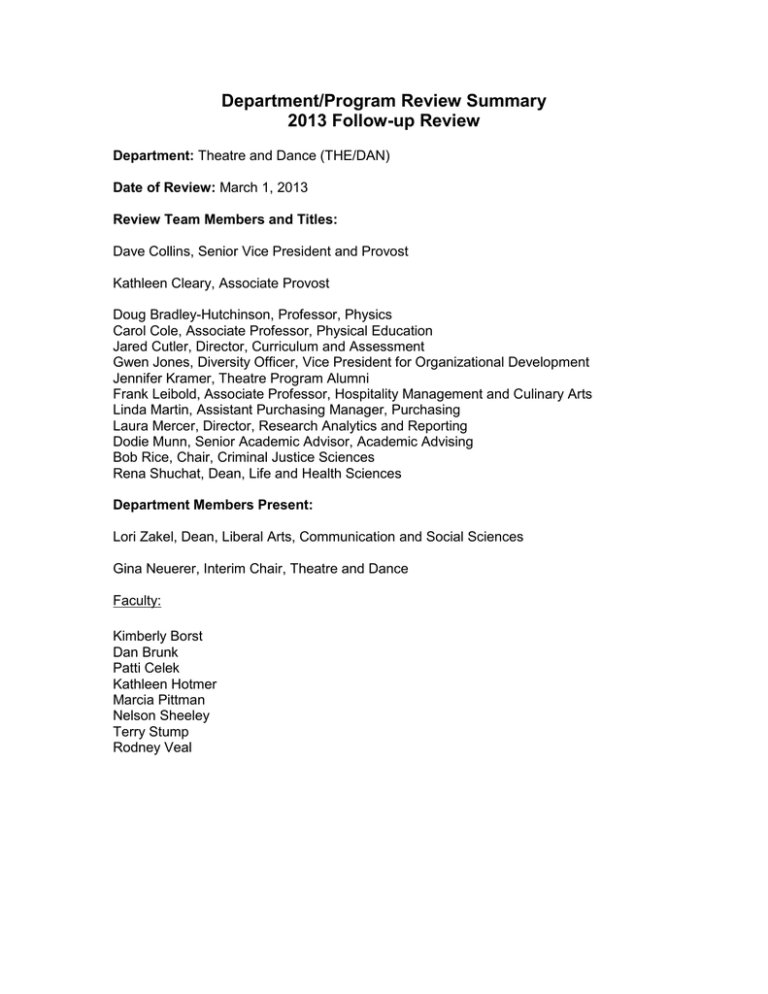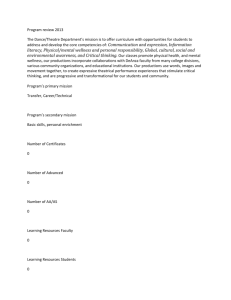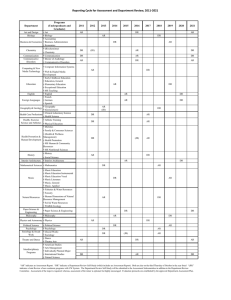Department/Program Review Summary 2013 Follow-up Review
advertisement

Department/Program Review Summary 2013 Follow-up Review Department: Theatre and Dance (THE/DAN) Date of Review: March 1, 2013 Review Team Members and Titles: Dave Collins, Senior Vice President and Provost Kathleen Cleary, Associate Provost Doug Bradley-Hutchinson, Professor, Physics Carol Cole, Associate Professor, Physical Education Jared Cutler, Director, Curriculum and Assessment Gwen Jones, Diversity Officer, Vice President for Organizational Development Jennifer Kramer, Theatre Program Alumni Frank Leibold, Associate Professor, Hospitality Management and Culinary Arts Linda Martin, Assistant Purchasing Manager, Purchasing Laura Mercer, Director, Research Analytics and Reporting Dodie Munn, Senior Academic Advisor, Academic Advising Bob Rice, Chair, Criminal Justice Sciences Rena Shuchat, Dean, Life and Health Sciences Department Members Present: Lori Zakel, Dean, Liberal Arts, Communication and Social Sciences Gina Neuerer, Interim Chair, Theatre and Dance Faculty: Kimberly Borst Dan Brunk Patti Celek Kathleen Hotmer Marcia Pittman Nelson Sheeley Terry Stump Rodney Veal Commendations: This was an excellent self-study – the chair of the department involved everyone in the department and used Annually Contracted Faculty and adjunct faculty to ensure that a broad overview of the department was provided that included the viewpoints of all who work in the department. Well done! Few community college Theatre departments in the country are accredited by the National Association of Schools of Theatre (NAST). It reflects well on the institution that Sinclair is one of the few community colleges that has this accreditation. This is a department that matches the quality of a four-year Theatre program with the resources of a two-year Theatre program - the department should be commended for how well it maximizes its resources and provides a level of quality that exceeds what would be expected at the community college level. The department puts on several outstanding productions every year – the quality of the shows is very high. These productions represent a significant outreach to the community – few departments on campus reach out to the public in quite the same way. Not only are the productions that the department offers of very high quality, but there is a high level of student involvement in these productions. As a matter of fact, the department stated that once the show starts, the faculty step away and let the students run everything. Giving the students so much responsibility provides an excellent opportunity for gaining experience in the field. The department maintains a close, personalized relationship with students in its programs. This relationship begins at the time the student enters the program, at which time individual meetings are held between the faculty and each student. The department employs a dual advising model that ensures a strong connection between students and faculty, and which demonstrates the department’s strong commitment to students as unique individuals. This strong connection leads many students to express appreciation to the faculty and pride at being part of the department. The self-study included a great number of testimonials from students expressing these sentiments. While the department doesn’t have a large budget for marketing, it is able to capitalize on inexpensive resources such as social media and word of mouth to advertise its productions. The department deserves commendations for being able to do so much with such a limited budget for advertising. Finally, while the Dance degree programs were discontinued a number of years ago, a number of excellent Dance courses are still offered by the department, and thanks to the dedication of the Dance faculty the enrollment in these courses has slowly increased over the years since the change in the program. Recommendations for Action: The department’s mission statement focuses solely on Theatre, but a substantial portion of the FTE generated in this department are from the Dance courses. The mission statement should be modified to be inclusive of the Dance component of the program. In addition, the program outcomes for the two Theatre degree programs are the program outcomes that are reported in the Annual Updates. The department should find ways to ensure that there is assessment of program outcomes that are applicable to Dance also, otherwise Dance will be “invisible” to assessment in the department. Perhaps the department could explore developing a set of outcomes for the Dance courses that are separate and distinct from the Theatre degree program outcomes, and that would allow for measurement of student learning across these courses. Regarding assessment, the department should find ways of collecting, compiling, and analyzing some of the data it is already generating. There is a considerable amount of assessment already taking place in the department, it just needs to be captured, analyzed, and reported. For example, after every production there is a “post-mortem” discussion regarding what went well and what could be improved – capturing and analyzing these discussions for trends across productions could be a means of conducting program assessment. Faculty evaluate student performances all the time on an individual level – capturing these individual level assessments and looking for trends related to program outcomes across all students would be an excellent approach to assessment of program outcomes. In the self-study and in the review team discussion the department mentioned that tracking graduates and former students is a challenge. Graduates spoke highly of the department, but there may be feedback from other former students that the department isn’t getting that would be useful for making improvements. The department is encouraged to explore efforts for increasing its ability to get feedback from a more comprehensive sample of graduates and former students. Social media may provide one avenue for accomplishing this to a greater extent, but there may be other avenues that could also be explored. The department should examine some of the new techniques being employed by Research, Analytics, and Reporting to increase response rates for its graduate surveys. The previous Program Review included recommendations to track outside work of students both while at Sinclair and after they graduate. It is recommended that the department explore ways to better capture what productions outside of Sinclair their students are involved in while in the program and what productions they are involved with once they leave Sinclair. Similarly, the successes of Sinclair graduates once they leave the program should be more widely disseminated to the public. Where appropriate - and with permission - highlighting the successes of former students in promotional materials may be an effective means of doing this. The department needs to ensure that its resources are not overextended – in terms of the number of productions the department tackles every year, in terms of the level of engagement with the students, or in terms of followup with graduates and former students, the department should work to maintain the delicate balance between meeting the needs of a high-quality program and spreading its resources too thin. Overall Assessment of Department’s Progress and Goals The self-study provided a superb overall picture of the department, the excellence of its programs, the close relationships with its students, and the quality of the work that is done. This department is one with a direct collaborative relationship with the community, and truly represents Sinclair well. Institutional or Resource Barriers to the Department’s Ability to accomplish its Goals, if any: Like many other departments on campus, the Theatre and Dance department struggles with space concerns. The new Campus Master Plan may provide opportunities to resolve some of these concerns, and departments should be involved in the master planning process to help inform the long-term development of solutions to these problems. Many departments struggle with marketing their programs. However, in the Theatre department this takes on an added dimension due to the need to not only market their programs to potential students, but also the need to market their productions to the community. How adequate marketing support to departments might be provided is a discussion that needs to involve the various stakeholders on campus. Tracking graduates and former students is widely perceived as a challenge among departments on campus – there are excellent existing tools, but response rates tend to be low. Research, Analytics, and Reporting is taking proactive steps to try and increase response rates, and departments should learn what these steps are and try and leverage them to get the best information possible from graduates and former students.




